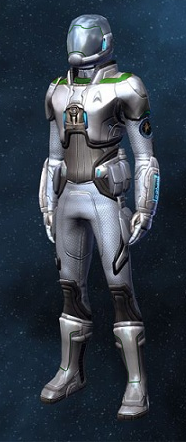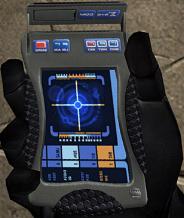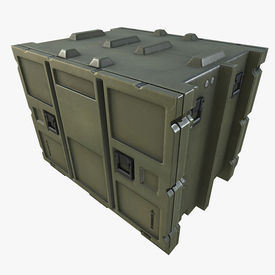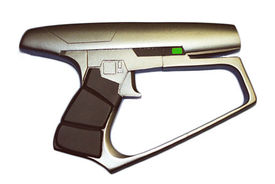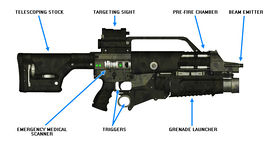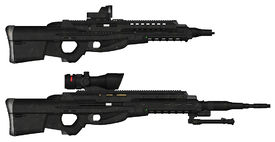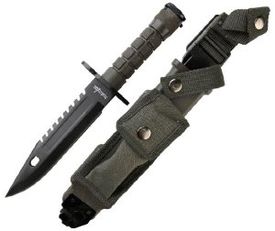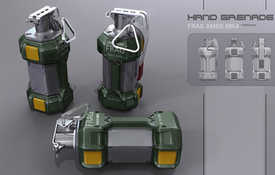USS Gorkon Marines/Equipment: Difference between revisions
(Created page with "__NOTOC__ {{Gorkon-navy}} ==Marine Weapons and Equipment Regulations== ====Non-combat==== A Starfleet Marine assigned to a duty post will wear their: *Standard Duty Uniform...") |
(No difference)
|
Revision as of 19:12, 19 July 2015
Marine Weapons and Equipment Regulations
Non-combat
A Starfleet Marine assigned to a duty post will wear their:
- Standard Duty Uniform
- Marine Combat Knife (concealed)
- Marine Aquila
Combat
When involved in combat operations, a Marine will wear their:
- Standard Duty Uniform
- Body Armor
- Helmet
- ISARAS
- Combat Tricorder
- Marine Combat Knife
- Marine Aquila
- Kits/Extra Weapons
Marine Equipment Descriptions
ISARAS
The Integrated Search and Rescue Armour System (ISARAS) is a modular armoured vest system based on the Crye and CIRAS systems of 21st century Earth, designed specifically for the varied duty requirements of the SAR Team. The vest itself provides moderate protection from physical injury.
The ISARAS can be fitted with numerous pouches and clips and customized to the individual wearer and their role on the SAR Team. For example, an engineer may have -- in addition to the phaser holster standard on all configurations -- a tricorder pouch and various tool and equipment pouches/clips, while a medical officer would carry advanced medkits, hyposprays, etc. A marine participant may have the majority of their ISARAS dedicated to carrying weaponry and explosives, depending on the role the individual has been asked to fill.
Helmet & Body Armour
Constructed with a hardened ballistic plastic, the CADM (Crystalline Ablative Dispersal Matrix) Ballistic Helmet is fitted with a retractable visor for a full seal. The helmet contains an advanced multi-function communications system. Operated by pupil tracking and a verbal shorthand, the Ballistic Helmet allows a Marine hands-free operation of the unit while concentrating on fighting and other attention-intensive tasks.
The helmet's multi-function communications system can send the Marine's coordinates to units nearby, perform mapping and navigation functions, and project command and mission data on the visor. It also includes a helmet-to-helmet infrared communications link, allowing discrete, short distance communications between individual Marines.
The ballistic helmet's visor also operates as a data screen for the user's Combat Tricorder and other linked or integrated systems. The visor's systems open programming structure allows it to accept multiple signals and upgrades in the field. It also features a three hundred sixty degrees proximity and target/threat tracking display, low light vision enhancement with rapid polarization, and audio enhancement/suppression to prevent disorientation. Sensory enhancements and protections can be modified to accommodate different species' sensory requirements; although after a certain point of acuity, the helmet is configured to allow a Marine's senses to work without the helmet's interference.
Each Marine's helmet is equipped and programmed to assist them in tasks specific to their position and MOS such as target designation, range finding, and chemical analysis. Officers and NCOs get units with more processing power and a broader range of capabilities and command functions, including signal interception, analytical functions, and troop status readouts.
The helmet can be modified to fit the, mission.
Personal protection for a Marine in combat operations is essential. Marine Body Armor is designed to provide a balance between protection and weight. The body armor is separated into upper body and lower body protective gear. The Marine Body Armor consists of the same CADM (Crystalline Ablative Dispersal Matrix) that is utilized in the Marine Ballistic Helmet. The protective vest contains remote biomonitors, which monitors the wearer’s health.
Combat Tri-Corder
The combat tricorder is a specialized tricorder carried by Starfleet Marines. Along with its basic tricorder functions, the combat tricorder is programmed with strategic and tactical information and EMF countermeasures. The combat tricorder links with the Ballistic Helmet for combat operations.
SAR Gear Box (1 Onboard)
- Tricorders and PADDs – 4x medical and 4x standard.
- 10x First aid kits with equipment such as dermal re-generators, bone knitters, painkillers and other drugs and equipment needed to adequately treat patients at the scene.
- 12x Flashlights, 10x power packs, 4x grappling gear, 6x heavy duty wiring and ropes, 12x survival packs (and rations), 2x heavy cutting gear, 4x harnesses, 6x underwater breathing apparatus, 10x spades and 10x pickaxes, flares, 8x pattern enhancers.
SWAT Gear Box (1 Onboard)
- Tricorders – Combat and standard.
- 6x Aquilas, 6x Type 204 SOSAR, 2x Engineering Kits, 2x Science Kits, 2x Medical Kits, 4x Each Grenade and Combat Shields.
- 12x Body Armour, 12x Helmets and 12x ISARAS
Command Center Box (1 Onboard)
- 1x Command Unit comparison of mobile sensor unit, minilab, small armoury, 2x computer station with multi use and enhanced comm array.
Marine Weapons Descriptions
Weapon Settings
|
Type-II Compression Hand Phaser (Aquila) (20 Onboard)
An updated model of the standard Type -II that was used throughout the early 24th Century, the Type-II Compression Hand Phaser (Aquila) pattern was designed for use by the Federation Marine Corps, Starfleet Hazard teams, and for more robust away missions. Along with these design improvements the Starfleet Corps of Engineers simplified the power scale and restructured the emitter to fire phaser pulses instead of a concentrated phaser beam.
Pulse Intensity Settings:
1, 3, 7, 9 & 12
Type 204 SOSAR (10 Onboard)
The Type 204 SOSAR (Special Operations (SWAT) & Search And Rescue) has the distinction of being the only phaser designed specifically for Starfleet Search and Rescue. Based loosely on the Type 200 rifle -- which is still used by some marine contingents -- the 204 SOSAR includes many improvements, including an adjustable telescoping stock, a rail system to allow the attachment of various scanning and infrared tools, an extremely durable plasteel body and the standard attachment of a grenade launcher (primarily for using "flash-bang" grenades).
Pulse Intensity Settings: 1 to 10, 13 & 16
Grenades: Flash-bang (Standard) Explosive ( Timed & Contact) Riot Gas
Type 32 (3 Onboard) and 32A OSR (3 Onboard)
A rather larger rifle, the Type 32's base design was adapted to become the Type 33 CQC. A workhorse rifle, the 32 is still used in many combat situations. Many prefer its more ergonomic design to that of the SOSAR. Its length makes the 32 generally ill-suited to SAR operations, but its Operational Support Rifle variant -- the Type 32A OSR -- has become standard equipment in any SWAT team. Essentially a sniper rifle, the 32A goes by the much less militaristic sounding name of "Operational Support Rifle." The 32A OSR shares the same body as the Type 32, with a longer barrel, more advanced and higher quality targeting sight and a folding bipod. The purpose of the OSR is to provide support for evacuations and protection for SWAT Team members performing their duties in hostile environments.
Pulse Intensity Settings (32): 1 to 10
Pulse Intensity Settings(32A): 1 to 16
Marine Combat Knife (20 Onboard)
The Marine Combat Knife is a survival and combat knife. It has a single edged twelve inch durasteel blade. The standard issue knife has a matte black finish to avoid reflection and to decrease the chances of detection.
The handle contains a small laser torch and a wire saw that can assist a Marine during wilderness survival.
Statistical Information: Length: Blade - 12 inches / Overall - 17.25 inches Weight: 3 pounds
Maintenance: Minimal maintenance is required since the blade maintains its sharpness and avoids rust over long term use.
Riot Gas Grenade
O-chlorobenzylidene malononitrile also know as Riot Gas (chemical formula: C10H5ClN2), a cyano carbon, is the defining component of a tear gas commonly referred to as CS gas.
Exposure causes a burning sensation and tearing of the eyes to the extent that the subject cannot keep their eyes open, and a burning irritation of the nose, mouth and throat mucous membranes causing profuse coughing, nasal discharge, disorientation, and difficulty breathing, partially incapacitating the subject.
Photon Grenade
A photon grenade is an anti-personnel weapon that is designed to disperse pulses of phaser energy on detonation.
Stun Grenade
A stun grenade, also known as a flash grenade or flashbang, is a non-lethal explosive device used to temporarily disorient an enemy's senses. It is designed to produce a blinding flash of light and intensely loud noise "bang" of greater than 170 decibels (dB) without causing permanent injury.
EMP Grenade
An electromagnetic pulse (EMP), also sometimes called a transient electromagnetic disturbance, is a short burst of electromagnetic energy. Such a pulse may occur in the form of a radiated, electric or magnetic field or conducted electrical current depending on the source, and may be natural or man-made. The term "electromagnetic pulse" is commonly abbreviated to the initialism EMP.
Micro-charges/Micro detonators
Small, variable-yield devices that can be used for breaching and destructive purposes.

